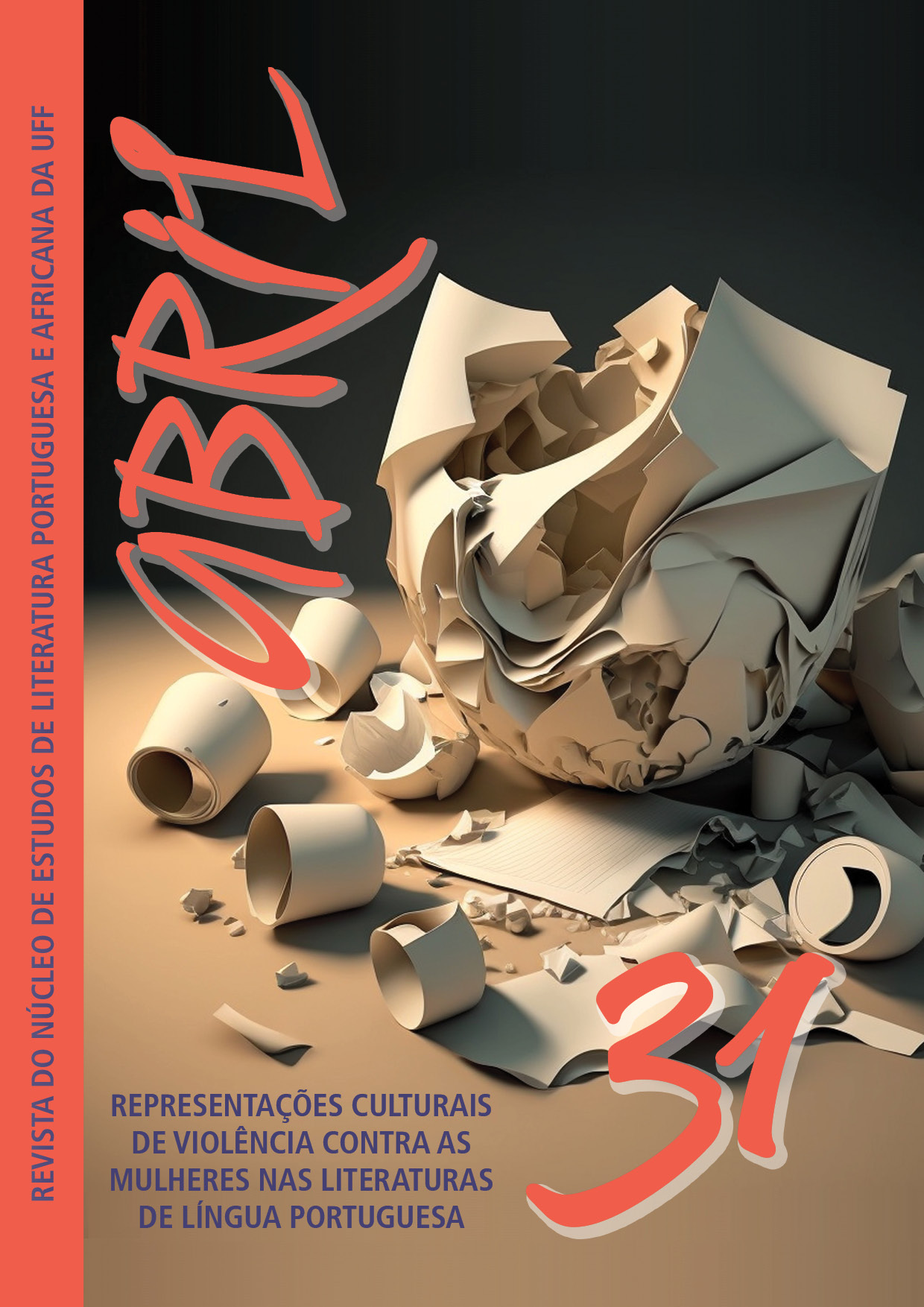“The signs were all there”: violences and abuses in the brand new portuguese fiction – reflections on Apneia, by Tania Ganho
DOI:
https://doi.org/10.22409/abriluff.v15i31.58669Keywords:
Violences, Abuses, Ficcional representations, Brand new Portuguese fiction, Tânia GanhoAbstract
This work presents, at first, a brief reflection on the relevance of fabulating the theme of violence and its respective echoes, whether in terms of the representation of abuse of the most diverse orders, or in the fable of dynamics of its side effects. Then, a reading of the most recent novel by the Portuguese writer Tânia Ganho, Apneia (2020), is proposed, highlighting the representations of violence and abuse against female and child characters. To do so, we will take as theoretical support some assumptions from Human Sciences thinkers, such as Hannah Arendt (1985), Judith Butler (2021), Marie-France Hirigoyen (2010) and Zygmunt Bauman (2008).
Downloads
References
ALEMANY, Carme. Violências. Tradução de Naira Pinheiro. In: HIRATA, Helena et al. (orgs.). Dicionário crítico do feminismo. São Paulo: Editora da UNESP, 2009, p. 271-276.
ARENDT, Hannah. Da violência. Tradução de Maria Claudia Drummond Trindade. Brasília: Editora da UnB, 1985.
BAUMAN, Zygmunt. Medo líquido. Tradução de Carlos Alberto Medeiros. Rio de Janeiro: Jorge Zahar Editor, 2008.
BUTLER, Judith. A força da não-violência. Tradução de Hugo Barros. Lisboa: Edições 70, 2021.
GANHO, Tânia. Apneia. 3ª. ed. Lisboa: Casa das Letras, 2021.
GOUVEIA, Aline. Mulher é, de fato, o sexo frágil? Especialistas analisam máxima patriarcal. Correio Brasiliense, 08/03/2023. Disponível em: https://www.correiobraziliense.com.br/brasil/2023/03/5078763-mulher-e-de-fato-o-sexo-fragil-especialistas-analisam-maxima-patriarcal.html. Acesso em 29 de maio de 2023.
HIRIGOYEN, Marie-France. Assédio moral. A violência perversa no cotidiano. 12ª. ed. Tradução de Maria Helena Kühner. Rio de Janeiro: Bertrand Brasil, 2010.
PELLEGRINI, Tânia. Despropósitos. Estudos de ficção brasileira contemporânea. São Paulo: Annablume: FAPESP, 2008.
REAL, Miguel. O romance português contemporâneo 1950-2010. Lisboa: Caminho, 2012.
RODRIGUES, Isabel Cristina. Entre-dois: tradição e inovação na narrativa portuguesa contemporânea. Guavira, Campo Grande, no. 19, 2014. Disponível em: http://websensors.net.br/seer/index.php/guavira/article/view/21. Acesso em 20 de maio de 2023.
SERRA, Paulo Nóbrega. Entrevista a Tânia Ganho. Palavras sublinhadas, 03/08/2021. Disponível em: https://palavrassublinhadas.com/entrevista-a-tania-ganho-so-escrevo-quando-consigo-por-me-na-pele-das-minhas-personagens/. Acesso em 28 de maio de 2023.
SILVA, Gabriela. A novíssima literatura portuguesa: novas identidades de escrita. Desassossego, São Paulo, v. 8, n. 16, 2016. Disponível em: https://www.revistas.usp.br/desassossego/article/view/122430. Acesso em 30 de abril de 2023.
VILLODRES, María López. Sete exemplos de masculinidade tóxica que você reconhecerá no seu dia a dia. El País, Brasil, 22/01/2019. Disponível em: https://brasil.elpais.com/brasil/2019/01/22/estilo/1548175107_753307.html. Acesso em 26 de maio de 2023.
VIZZOTTO, Márcia; PEREIRA, Marina Couto. Hibisco: do uso ornamental ao medicinal, 2008. Artigo em Hypertexto. Disponível em: http://www.infobibos.com/Artigos/2008_4/hibisco/index.htm. Acesso em 28 de maio de 2023.
Downloads
Published
How to Cite
Issue
Section
License
Copyright (c) 2023 ABRIL – NEPA / UFF

This work is licensed under a Creative Commons Attribution-NonCommercial 4.0 International License.
I authorize the journal Abril - NEPA/UFF to publish the paper of my authorship/responsibility that I now submit, in case it is accepted for online publication.
Moreover, I declare that this contribution is original, that it was not submitted to any other editor for publication, and I sign the present declaration attesting the truth of all its contents.
The copyright of the works published at the virtual space of the journal Abril - NEPA/UFF are automatically entitled to the journal. Their total or partial reproduction is conditioned to the authors' citations and publication data.

Abril is licensed under a Creative Commons - Attribution-NonCommercial 4.0 International (CC BY-NC 4.0).









